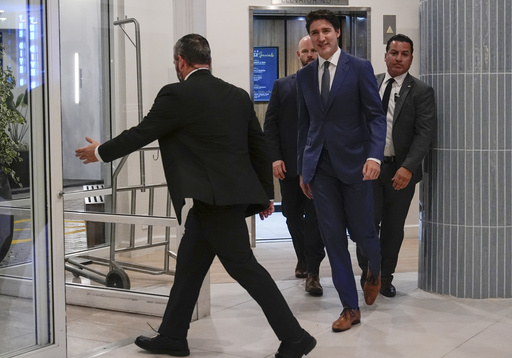
Prime Minister Justin Trudeau conveyed to Donald Trump that if the president-elect proceeds with his intention to impose significant tariffs on Canadian goods, it would adversely affect American consumers as well. This statement was made by a Canadian government official who was present at a recent dinner meeting between the two leaders.
Trump has expressed threats to implement tariffs on imports from Canada and Mexico if what he describes as the influx of drugs and migrants across the U.S. borders does not cease. He announced last week through social media that he would initiate a 25% tax on all products from these neighboring countries, potentially issuing it as one of his initial executive orders once he takes office.
Public Safety Minister Dominic LeBlanc, who oversees border security matters, attended the dinner at Trump’s Mar-a-Lago club. The meeting was organized by Trudeau, who aimed to persuade Trump not to proceed with the tariffs by illustrating that the situation along the northern border starkly contrasts with that of the U.S. southern border with Mexico.
LeBlanc relayed in Parliament that Trudeau emphasized the need to safeguard the Canadian economy and its workforce from the unjust tariffs. Furthermore, discussions highlighted the potential detrimental effects such tariffs could inflict on the American economy and the affordability of goods for U.S. citizens.
Economists anticipate that if Trump enacts the proposed 25% tariffs on all imports from Canada and Mexico, the resulting price increases would counter his promises to alleviate inflationary pressures on American family budgets. Many companies would likely feel compelled to pass on these heightened costs, significantly elevating prices across essential goods like food, clothing, cars, and alcohol.
The Produce Distributors Association recently indicated that such tariffs would likely drive up prices for fresh produce, thus negatively impacting American farmers when retaliatory measures are taken by neighboring countries. In response to Trump’s threats, Canada is already considering possible retaliatory tariffs on specific U.S. items.
Trudeau returned home from his dinner with Trump without any firm commitments from the president-elect concerning his proposed tariffs. Although Trump characterized their discussions as “productive,” he did not signal any intended withdrawal from his pledge to impose tariffs, which Canada claims unfairly associates it with Mexico in matters regarding drugs and migration.
LeBlanc rebutted claims that the Canadian delegation returned with nothing of significance, asserting that the interaction was indeed productive and underscored Trump’s willingness to collaborate going forward.
At the dinner table were additional aides including Howard Lutnick, Trump’s nominee for Commerce Secretary, North Dakota Governor Doug Burgum, selected to lead the Interior Department, and Mike Waltz, designated as Trump’s national security adviser.
Kirsten Hillman, Canada’s ambassador to the U.S., reiterated her belief that the distinct nature of the Canadian border was understood during discussions. She asserted that Canada does not significantly contribute to issues surrounding drugs and migration.
In a separate response, Mexico’s President Claudia Sheinbaum pushed back against these comments, stating that Mexico deserves respect from its trading partners. She highlighted that Canada also grapples with its own issues related to fentanyl use and expressed a desire for Canada to acknowledge Mexico’s cultural wealth.
Statistics show a stark contrast between the drug seizures and migrant encounters at the different borders. Last fiscal year, U.S. customs agents confiscated only 43 pounds of fentanyl at the Canadian border compared to a staggering 21,100 pounds at the southern border with Mexico. Most fentanyl in the U.S. is produced by Mexican cartels that utilize precursor chemicals trafficked from Asia, contributing to approximately 70,000 overdose fatalities each year.
On the topic of immigration, U.S. Border Patrol reported that it had 1.53 million interactions with migrants at the southwest border with Mexico from October 2023 to September 2024, while only 23,721 encounters took place at the Canadian border during the same timeframe.
The economic relationship between the U.S. and Canada is substantial, with Canada being the primary export destination for 36 U.S. states. Daily, nearly $3.6 billion CAD (approximately $2.7 billion USD) worth of goods and services cross the border, and Canada supplies about 60% of U.S. crude oil imports, along with 85% of its electricity imports.
Canada serves as a crucial foreign supplier of essential materials such as steel, aluminum, and uranium to the U.S. Additionally, it possesses 34 critical minerals that the Pentagon relies upon for national security interests and is actively investing in their acquisition.
